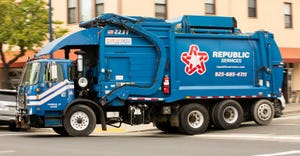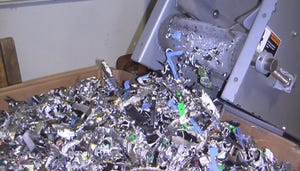From Rickety Trucks To Big Bucks
April 1, 1996
Susan DeGrane
In l972, Larry Edwards was 25. He had returned from the Vietnam War and he'd been to college. He knew he wanted to go into business for himself, but doing what exactly he wasn't sure.
He came across an old trash truck selling for $3,000. Edwards bought the truck with $1,000 he'd saved and a $2,000 bank loan co-signed by his uncle.
"The payment was $107 a month," Edwards recalled. "This truck was pretty dilapidated. The emergency brake was a cinder block. I took that truck to the landfill for the first time and didn't know how to unload it. The other guys with their trucks were laughing and I had to ask one guy at the landfill, 'How do you unload this thing?'"
Now, 24 years later, Edwards presides over and owns a $35 million per year disposal company with 175 employees, 77 trucks and a permanent headquarters that features a truck yard, dispatch facility, sales and management offices and a 24-hour garage. His company, AAA Recycling and Removal Services Inc., Fairfax, Va., is the largest privately owned waste hauler in northern Virginia.
The company serves 110,000 homes, as well as apartments, offices and restaurants in more than 200 communities. Its blue-bodied trucks with white and yellow cabs collect 500 tons of trash and recyclables per day - the trucks receive a daily wash and special brush wash on the weekends. The company prides itself on its uniformed drivers, who are known for their personable and courteous manner. "We had one driver invited to a kid's birthday party," said Mark O'Brien, sales manager. "The boy always saw the same driver and [when] his mother asked him who he wanted to invite to his party, [he included the driver]."
Keeping Customers Content The company serves individual customers rather than municipal contracts. That arrangement is partially due to how Fairfax County and other neighboring communities have developed.
"In the 1950s, the county was very rural," Edwards said. Municipalities didn't collect trash in rural areas. As the county grew it didn't necessarily take over, but left the trash collection business to private haulers.
"Municipal contracts tend to be less user friendly," said Edwards' wife, Mary, co-owner and secretary-treasurer. "Another company could come in at 10 cents less and not offer nearly the services but still get the bid. With single-family homes particularly, the customers seem to appreciate the service, and our prices are competitive."
Fairfax County is home to many government workers who are employed in Washington, D.C. People move in and out fairly rapidly. "The customer is always right because he pays our salary," said O'Brien. "But we also know that for us the address is the customer too. When a customer moves we send a letter thanking them for their [patronage] and a coupon for a month's free service to leave behind for the next resident."
Beyond direct mail solicitations, AAA's Toter carts feature the company's name and telephone number on the side, as do the trucks that make three swipes per week through the neighborhoods - two for trash collection and one for recycling.
Because the company predominantly services individual residences, the goal is to achieve service density. Other haulers service the same areas, which is why route sheets can be extremely important references for drivers as they make their collections.
The company's aggressive sales and marketing departments survey customers regularly. When one survey revealed that customers wanted two trash pickups per week and a separate pickup for yard debris, AAA began providing those services almost immediately, purchasing 25 additional trucks and hiring 30 new drivers in the process.
"We [collect] in fairly affluent areas where people are concerned about how their lawns look," O'Brien said. "If customers want to bag leaves and grass and they're willing to pay for its collection, we do it.
"The main reason for our success is that we offer good, dependable service. Our customers like to think there's a trash fairy out there who makes it all disappear. The fact that they don't have to call us about trash that isn't picked up is why they keep using us."
Rolling With The Times Flexibility is an important asset in the waste industry, Edwards says. "One advantage of being privately owned is that if the competition is doing something, we can respond quickly by offering a new service."
In 1972, more than l20 waste haulers were operating in Fairfax County, Edwards says. Today only half as many operators exist within five neighboring counties.
While other haulers were going out of business, AAA was growing and acquiring them - more than 30 in all - Edwards said. "I think those that went out of business were not willing to change and keep up with the times," he said. "If something's a regulation, it's a regulation. There's really no choice. That's where a lot of haulers fell out of the running. But, a lot of things have been good for our industry with regard to regulation. Safety is one."
Edwards has remained flexible in many ways. His business initially began serving commercial customers. "When those clients accounted for 10 percent of the business and 90 percent of the headaches, we got out of commercial business and concentrated on residential," Edwards said. "In 1989 we got back into it and now we're the second largest privately owned commercial hauler in the area."
AAA is flexible in adjusting to customers and it considers the needs of its employees. For example, when the company was attempting to increase pickups and add recycling routes, one solution was to change the drivers' work week from six to five days with longer hours. "We found that people ... wanted that extra day off. It worked out very well for us," said O'Brien.
"We try to treat people with respect," Edwards said. The company offers a retirement plan, sizable Christmas bonuses and has rented hotel rooms for employees attending its annual Christmas party. Company picnics or cookouts may happen as often as once a month.
"We'll send birthday cards to the wife of an employee to let her know what a good job he's doing at work," Edwards said.
Turning The Corner Although Edwards has proven himself successful, the road to that success has been steep and hard. In 1984, a competitor burned half of his truck fleet to the ground. "I needed 10 trucks and I only had five," he said. "Trying to get the trash off the street then was a real challenge. We worked around the clock."
For the first 10 years, Edwards worked seven days a week from 5 a.m. to 9 or 10 p.m. "It was 10 years before my wife and I went on vacation," he said.
Edwards married one year after starting the company. "I picked up trash Saturday afternoon until 2. In the meantime. she's waiting, wondering if I'm going to make it [to the ceremony]," he said. "We stayed at a hotel and by 5 a.m. Monday, I was picking up the trash [again]."
In 1986, Edwards purchased AAA's current business site, which is strategically located across from a landfill. Construction, however, was plagued with zoning problems. Prior to completing the building and grounds in 1994, the company operated out of two locations.
Despite delays, the two-story structure is extremely functional. Rooms were built for specific purposes, such as dispatch, a locker room for drivers and sales offices. This offers an advantage over operating at a site originally constructed for other purposes. "Everything had to make sense," Edwards said.
In 1988, AAA seemed to turn the corner. "Growth had been steady, some years better than others up until that time," Edwards said. "We'd bought another company, which brought our production together and got us over the hump. We actually started making money."
Five years ago, the company made another stride when it began operating its own 24-hour vehicle maintenance facility, which helped keep the collection operations on track.
Hard work and the acquisitions are the main reasons behind the company's growth. At 48, Edwards isn't slowing down. "We're always looking to acquire. A company has to continue to grow because, no matter what, you always lose business. You must be pushing for new business and better ways to stay competitive. You have to stay on your toes or competitors will pass you by."
You May Also Like


